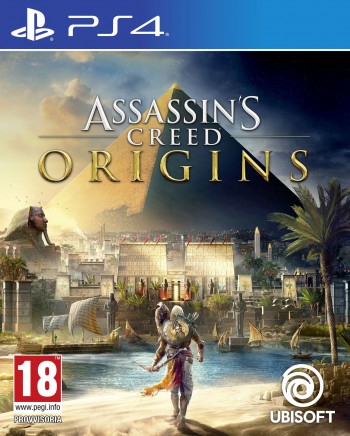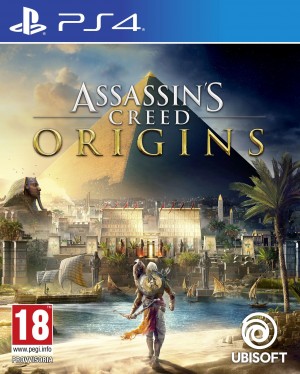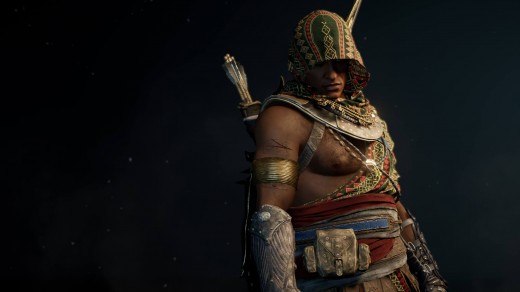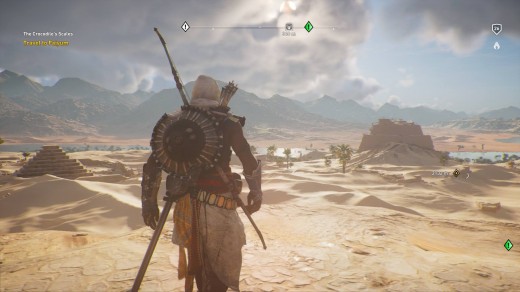
Assassin’s Creed: Origins Review (PS4) — A Franchise Rejuvenated?
Raves
Rants
I’ve stuck with Desmond Miles since his first run-in with the Animus. Experienced Ezio’s birth all the way up to his death. Witnessed the American Revolution through the eyes of Ratonhnhaké:ton and even lived a pirates life with Edward Kenway. Many had given up on the creed a long time ago, but my journey only came to an end with Arno in Assassin’s Creed: Unity. From then I knew the Assassin’s Creed series had nothing left for me. But Assassin’s Creed: Origins promised new and different; enough to pique my interest. And with the time I had in ACO, I can attest to that promise. My withered interest now glistens brightly.
STORY
The story of Origins follow Bayek from 47 BCE, a Medjay tasked with protecting the Pharaoh and all its people. Upon Pharoah Ptolemy’s ascension to the throne, all Medjay were sentenced to death and the people of Egypt were subjected to his dark reign. Bayek survives the culling and sets out on a personal vendetta to assassinate all that is responsible for what happened to him and to all the people of Egypt. The story leans heavily on family, particularly on fatherhood, or the lack thereof, serving as his primary motivation to carry out the assassinations. Duty to his people is but a convenient plus.
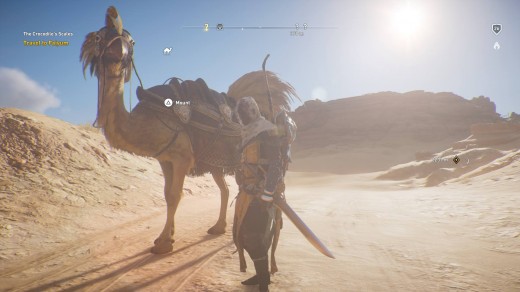
As with most AC protagonists, Bayek’s persona, as well as the vocal performance behind his bravado, are quite alluring. Its hard to tell his mood as he goes from hot to cold every two seconds, but this actually is one of the things that makes him such an interesting lead. The historically-significant NPCs surrounding Bayek are, for the most part, just as appealling.
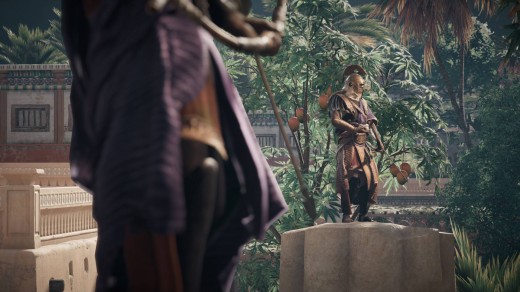
The historic events of BCE and Bayek’s role in all of it is pretty well sewn together. His journey and his convictions, are interesting to witness as they unfold. Plenty of intriguing albeit expected twists come along quite nicely while the main storyline is, for better or worse, brief and straightforward. Though some gamers will no doubt find ACO’s story lacking, the game offers up a substantial amount of subplots and activities that should keep them pretty busy. Just don’t expect The Witcher 3 levels of detail in that department. ACO does well to take advantage of it’s setting in regards to filling in the gaps of the already shrouded timeline, though honestly, but I couldn’t help but feel that Ubi could have done more to really capitalize on the game’s setting.
GAMEPLAY
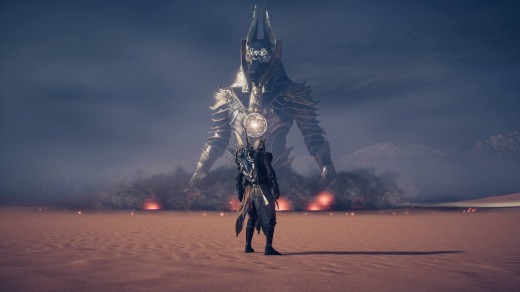
Combat is much more fluid and fast-paced, implementing a new loot system akin to that of an action RPG. There’s even a skill tree branching across three of Bayek’s combat facets (Combat, Stealth/Archery, and Tools). Not long after the first few hours does It become apparent to me that Ubisoft wants to take the series into a Witcher-y direction. The game even sports a solid horseback combat system. Personally, this is exactly where I’d want the franchise to go. The Witcher 3: Wild Hunt had practically set the standard for modern day action adventure games and honestly, we need more like it.
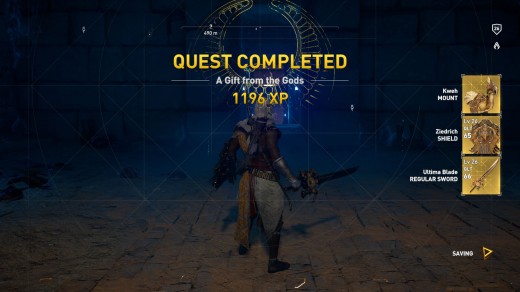
This isn’t to say ACO abandons its own quirks. For one, you can still climb things. With parkour simply mapped to a single button, you can vault and climb over things now in a more seamless fashion. Even more impressive that you can climb large rocky formations from virtually any angle. Stealth and strategic use of tools are also largely present, an entertaining alternative from the overhauled active combat gameplay. Bayek has access to a number of weapon types each with their own advantages and disadvantages. Even his primitive bow comes in different types (Rapid-firing light bows and powerful single shot Hunter bows). Every weapon that Bayek loots come with a random set of abilities and rank. The higher the rank, the better the abilities, some unlocking unique skills and passives.
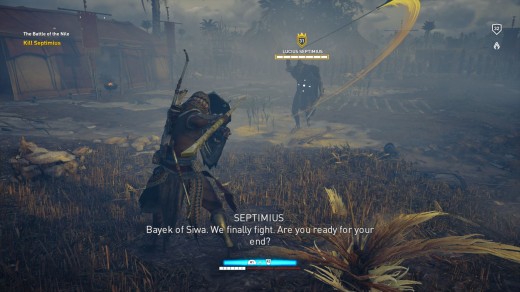
The assassin’s eagle-vision is far more literal this time around. Bayek’s companion eagle, Senu, constantly patrols the sky as he explores Egypt. You can switch between Bayek’s and Senu’s vision in real-time, allowing you to locate interesting points on the map as well as mark enemies and even create diversions. Though Bayek can acquire certain skills that allow Senu to do some extra tricks, this once again feels like a missed opportunity to turn this companion system into a more prevalent mechanic in the Assassin’s Creed formula.
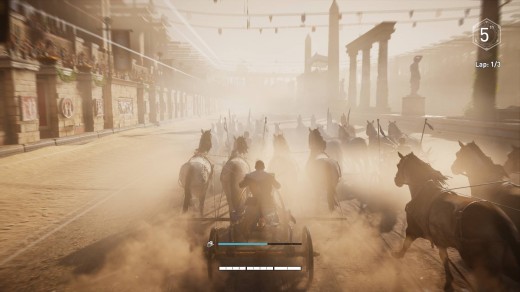
ACO offers a slew of mini-games and activities to keep things interesting. The highly praised Naval combat makes a slight return, but ACO also offers some entertaining new ones like the Arena and Chariot racing. Most interesting are the daily events which offer random objectives that reward players with a random rare gear, and the occasional community events that are more elaborate(in a fun way) and offer greater rewards.
VISUALS & PERFORMANCE
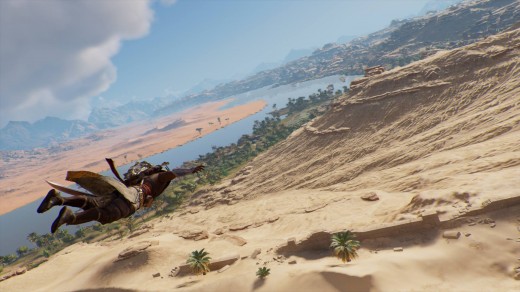
It’s unmistakably evident that ACO’s setting is its greatest quality. For a game that takes place in a location that leaves little room for variety, Ubisoft manages to craft a convincing 1st Century BC Egypt with rich locales and historically accurate structures ripe for hours of exploration. It’s pretty damn close to actually visiting Ancient Egypt.
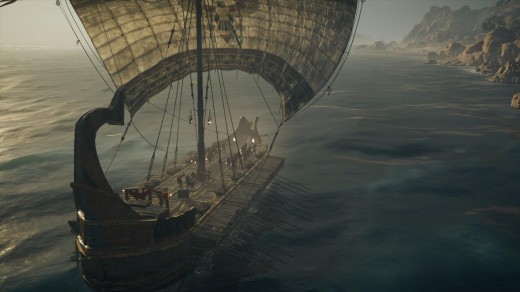
The overall visual tone is so strong that even random areas that aren’t of any particular landmark can look remarkably glowing. It’s even worth noting the irony that Assassin’s Creed: Origins sports some of the best water animation in any AC game, rival only to Black Flag’s.
ACO’s world map is utterly massive which makes the ability to program your mount to automatically follow roads and travel to objectives convenient. Though ACO maintains a solid framerate even on a standard PlayStation 4, it does, unfortunately, suffer from some seemingly random frame dips. These dips have only ever happened a handful of times in my 20 or so hours of playing, but in that handful of times, at least two of them were critical.

